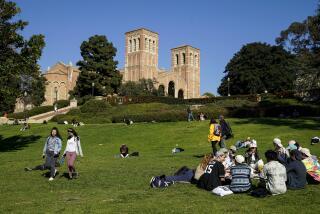U.S. Puts Onus on Palestinians
President Bush and British Prime Minister Tony Blair pledged Friday to use the transition to a new Palestinian leadership to push for peace in the Middle East, but bluntly warned the Palestinians to build their state on reforms favored by the Western allies.
Appearing with Blair at the White House just hours after the burial of Yasser Arafat, Bush said his death offered a “great chance to establish a Palestinian state” and a broader peace in the region.
Yet, though promising to mobilize international support on the Palestinians’ behalf, Bush made it clear that the burden was on the new leadership to undertake political and economic reforms and overhaul security services.
A Palestinian state and a secure Israel could be reached “only by one path: the path of democracy, reform, and the rule of law,” Bush said.
“We’ll hold their feet to the fire to make sure that democracy prevails,” he vowed.
The president, whose budget and military are stretched thin, also made a broad appeal to European governments to work with Washington on an agenda that includes the Iraq war, the Iranian nuclear issue, Afghanistan and terrorism.
With many Europeans increasingly alienated from the United States, Bush has promised that “in my second term, I will work to deepen our transatlantic ties to the nations of Europe.”
In another fence-mending gesture, the president announced that he planned to make a trip to Europe soon after his January inauguration.
The meeting, Bush’s first with a head of state since his reelection, was politically important for Blair, whose popularity has waned at home because of his support for the Iraq war. Bush’s commitment to renew the Mideast peace effort was a goal of the trip, analysts said, and could help Blair at home as he prepares for an election in the middle of next year.
Bush appeared more cautious than Blair about the peace effort, and more determined to ensure that the Palestinians take steps before the international community is fully committed. The president was noncommittal on proposals favored by Blair to convene an international conference on the peace effort and to appoint a special U.S. envoy to move the process along.
“I’m all for conferences as long as conferences produce something,” Bush said.
White House officials made it clear that until more progress was made toward its goals for Palestinian reform, Bush was not interested in the two proposals.
For now, “we don’t need to think about a conference and an envoy,” one official said.
“We need to get this work done. We know what the work is. We have made a start on this work in the past year or two, but we can do a lot more now on building the institutions of a Palestinian state.”
Asked whether he wanted to see a Palestinian state by the end of his term, Bush responded, “I hate to put artificial time frames on things.”
But, he added: “I think it is fair to say that I believe we’ve got a great chance to establish a Palestinian state, and I intend to use the next four years to, to spend the capital of the United States on, on such a state.”
Both leaders offered their condolences to the Palestinian people, but said nothing specifically about the cause of their grief, the death of Arafat.
Bush, who had refused to meet with the Palestinian Authority president, said only: “Our sympathies are with the Palestinian people as they begin a period of mourning, yet the months ahead offer a new opportunity to make progress toward a lasting peace.”
The two countries issued a statement outlining steps needed to achieve a lasting Israeli-Palestinian peace based on a vision of two independent, democratic states. It included support for Palestinian elections; creation of Palestinian economic, political and security infrastructures; and Israeli disengagement from the Gaza Strip.
“If the Palestinians choose not to go down that path ... then the president has made it clear that’s not a path to statehood,” one senior U.S. official said after the joint news conference.
The administration wants the Palestinian Authority to establish democratic processes to select leaders, who now are chosen mostly through cronyism, and to reorganize the security services to crack down on terrorism.
Since Bush’s election victory, the administration has been making a number of efforts to reach out to Europeans. Last week, National Security Council officials Elliot Abrams and Daniel Fried invited ambassadors from France, Germany, Britain and Italy to the White House to discuss the Middle East peace issue.
Though no agreement was reached, there was “clearly desire for a new spirit on both sides,” one European diplomat said.
Top administration officials are scheduled to have a series of meetings with Europeans over the coming months, including a U.S.-European summit, NATO gatherings and an international conference sponsored by Egypt to discuss support for Iraq’s interim government.
Many difficult issues remain, including financial support and military training for Iraqis, as well as the creation of a military force to protect United Nations election workers in Iraq.
Officials said Bush’s trip to Europe would occur within a few weeks of his Jan. 20 inauguration. It would include stops in Brussels, headquarters of the European Union and North Atlantic Treaty Organization, and other locations.
More to Read
Get the L.A. Times Politics newsletter
Deeply reported insights into legislation, politics and policy from Sacramento, Washington and beyond. In your inbox three times per week.
You may occasionally receive promotional content from the Los Angeles Times.







